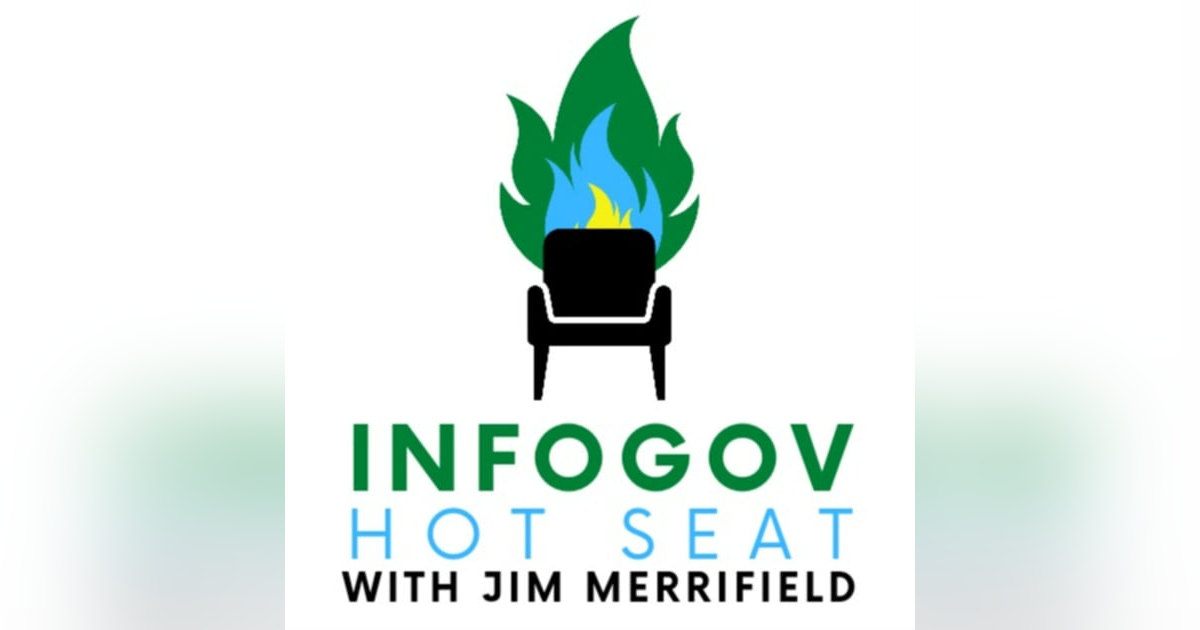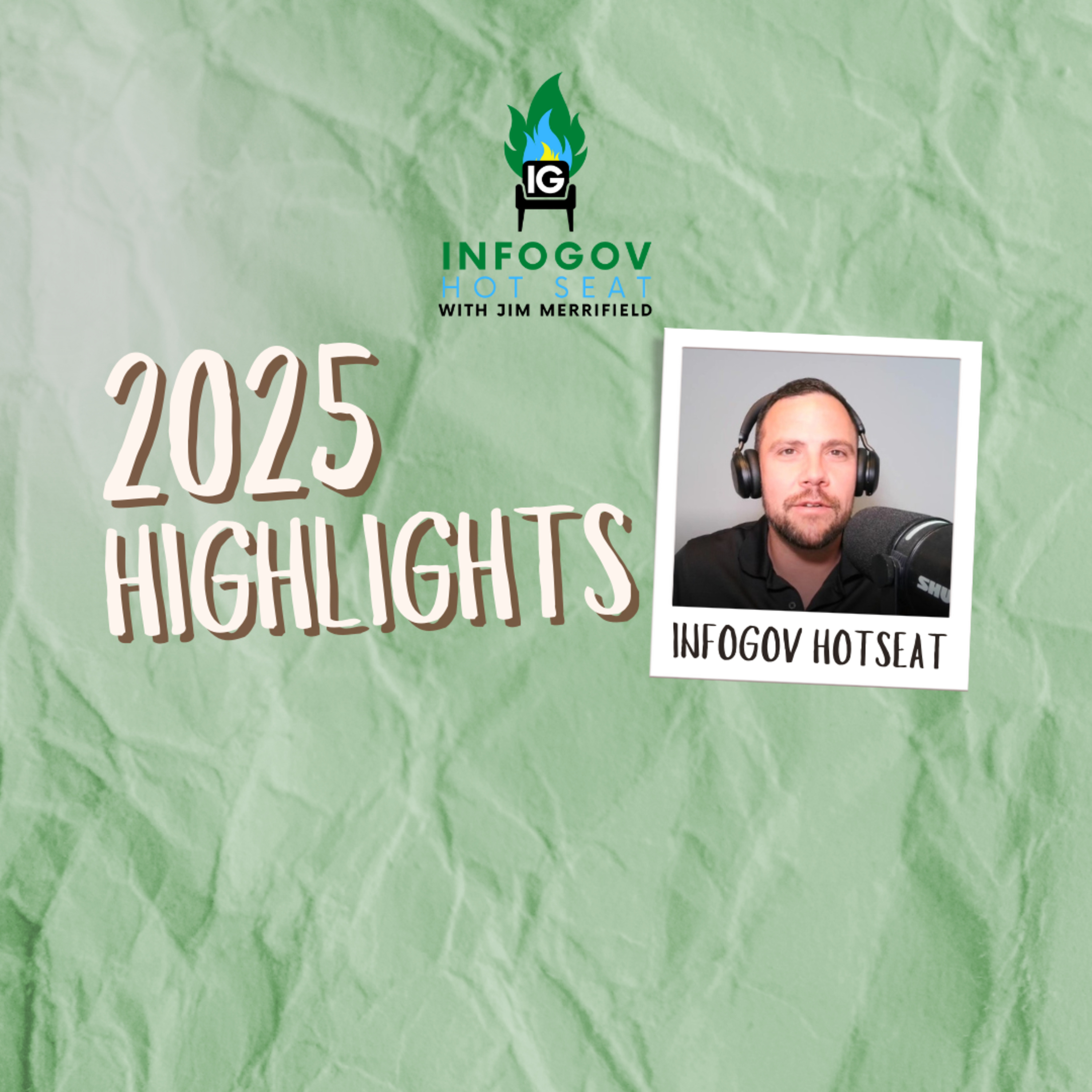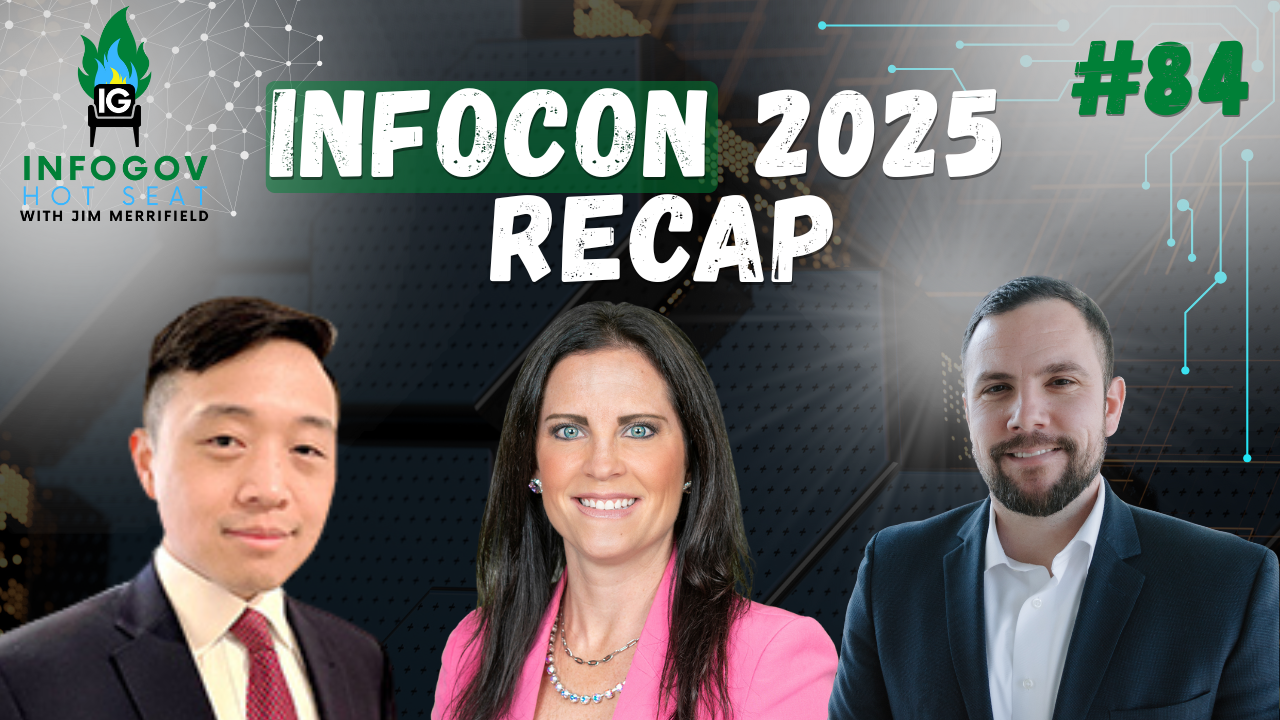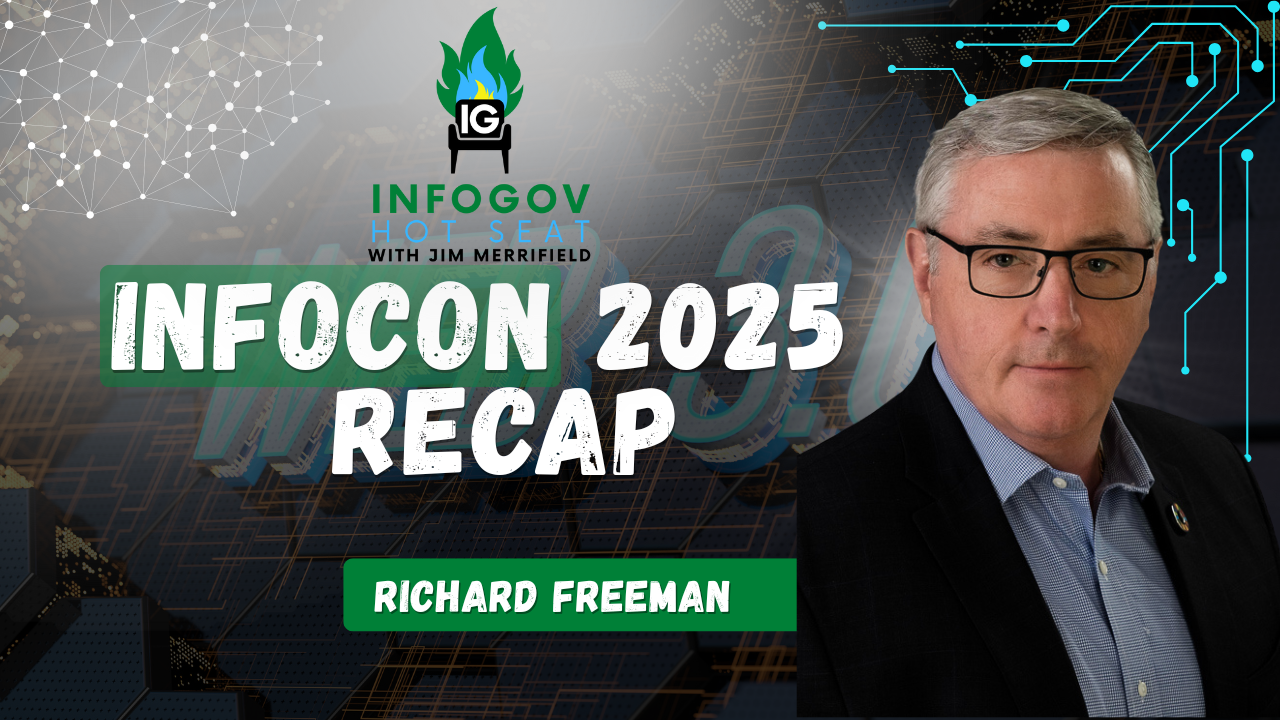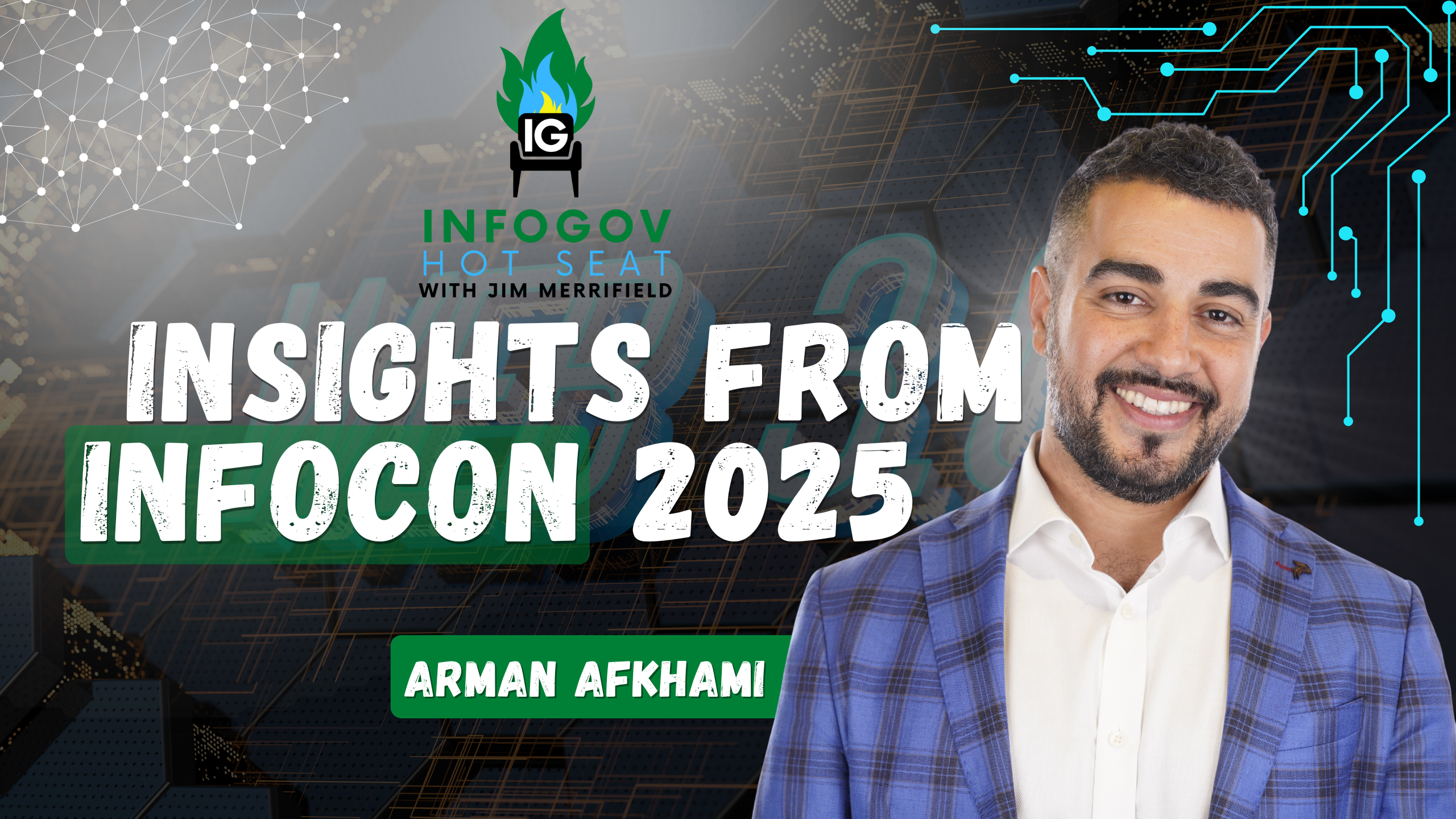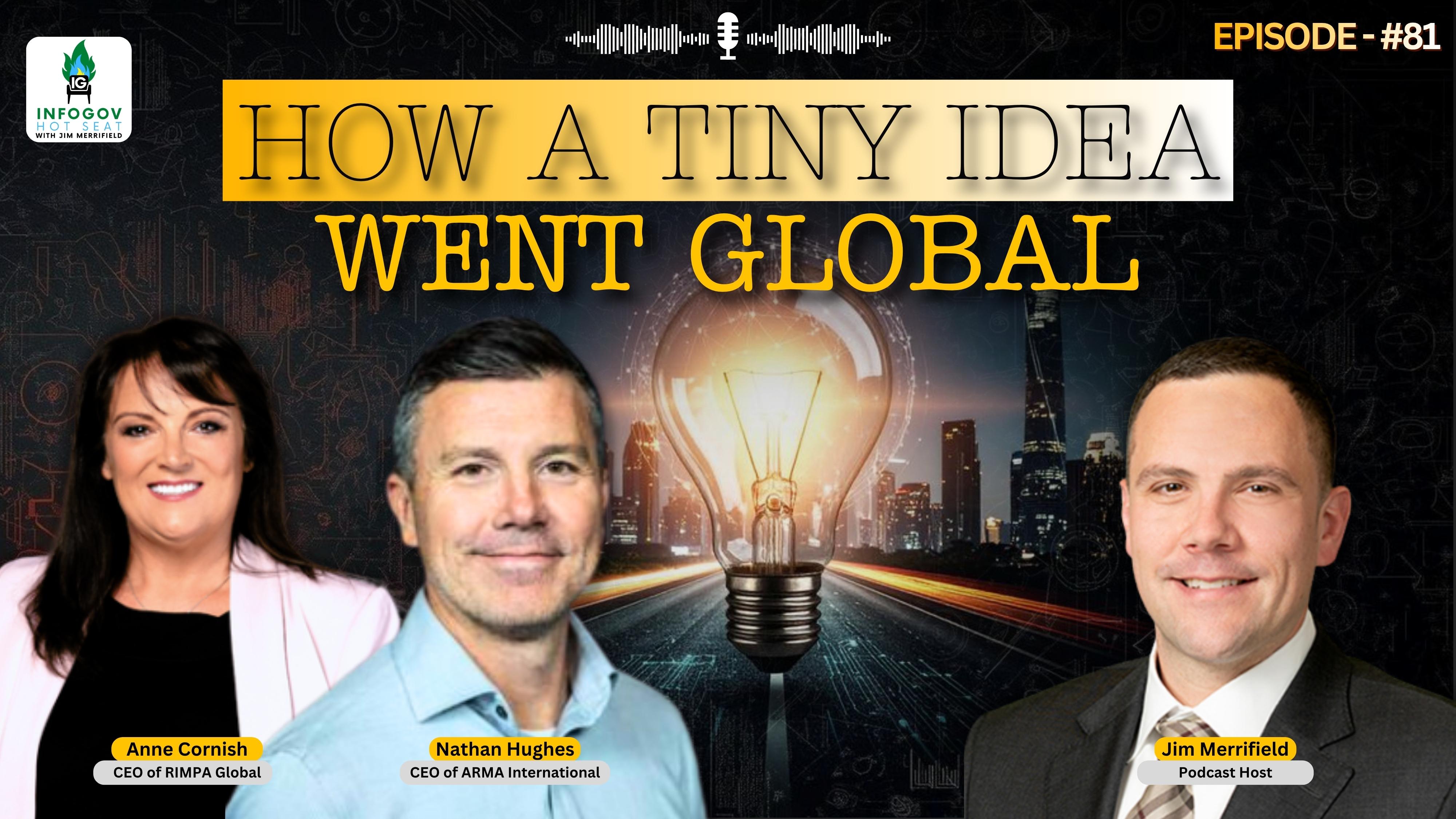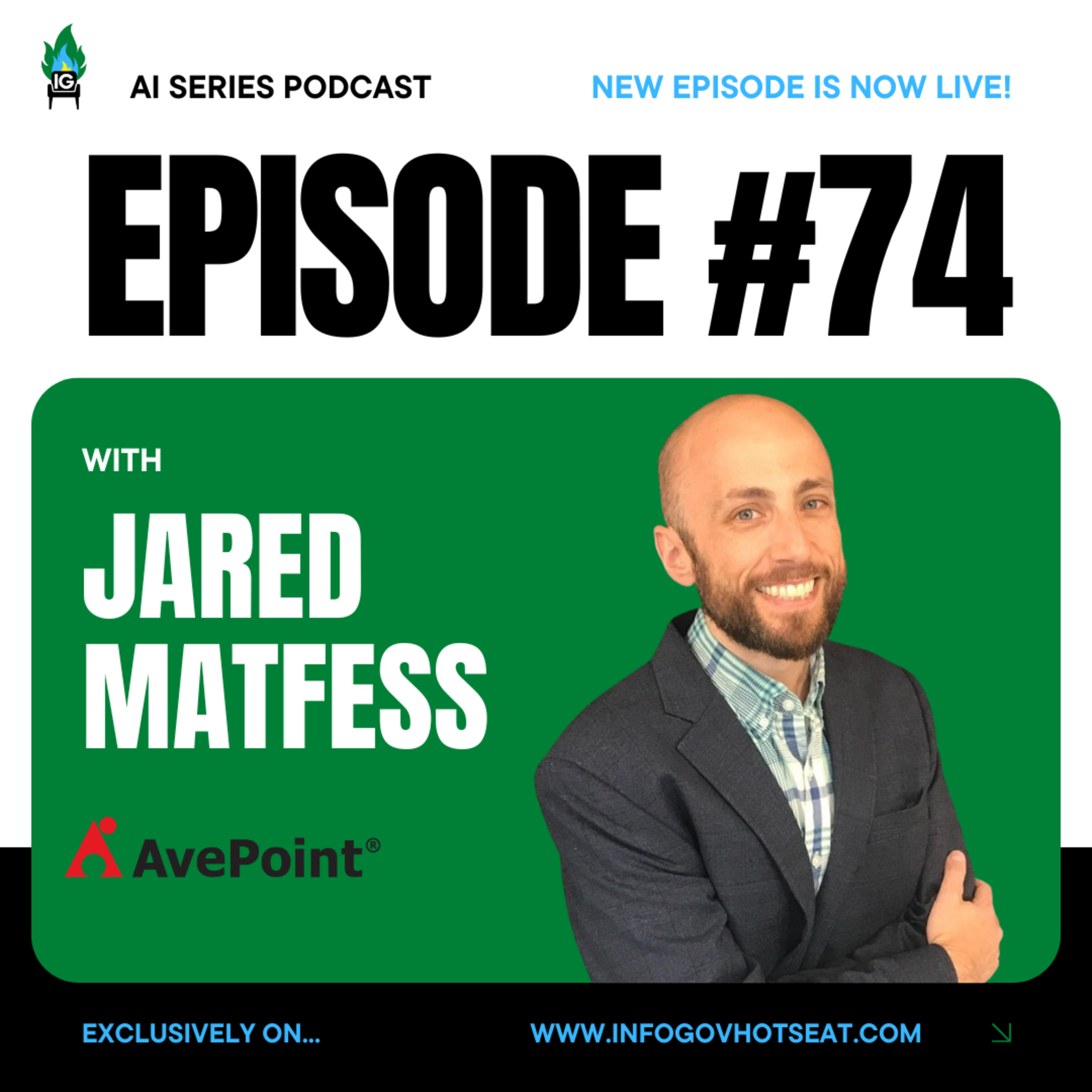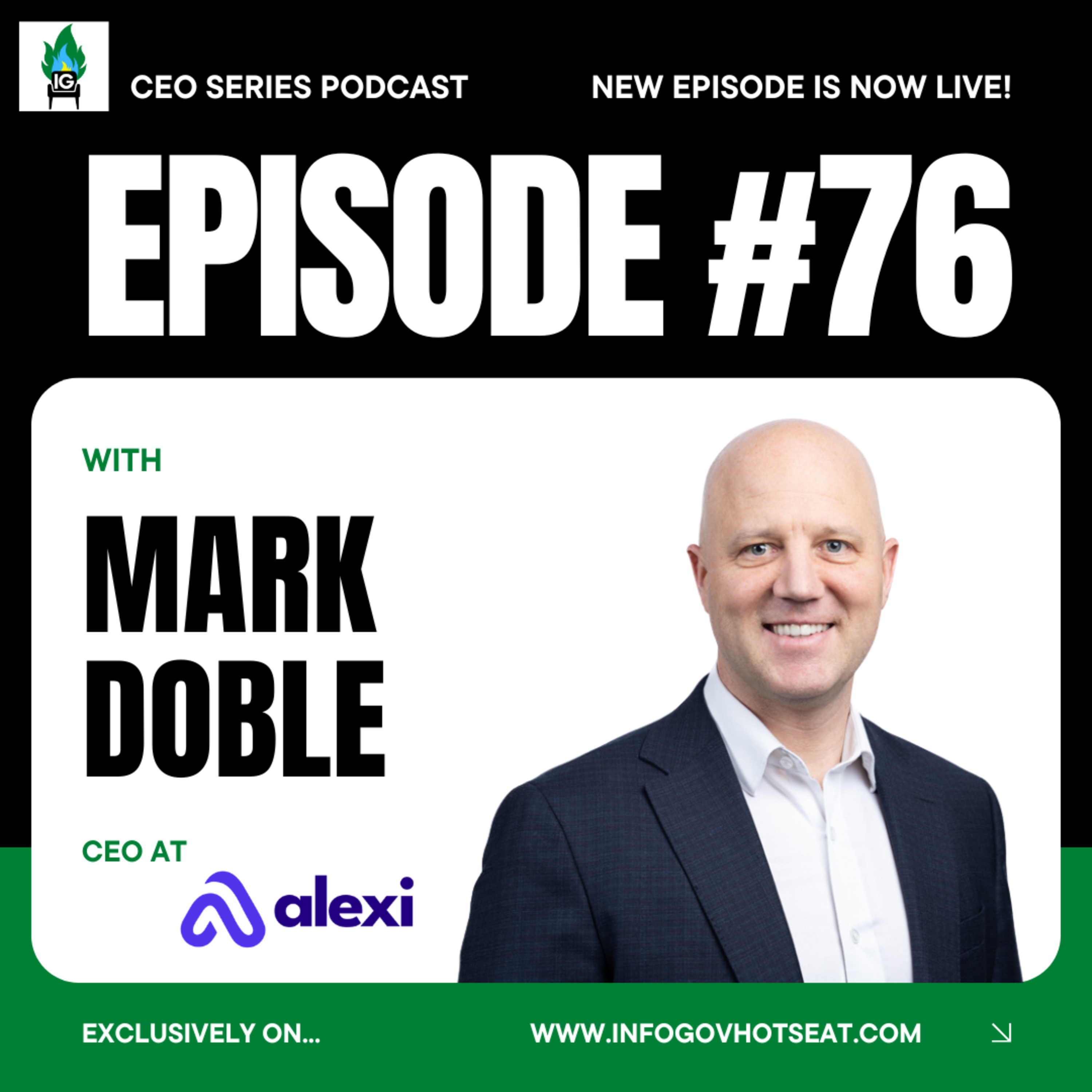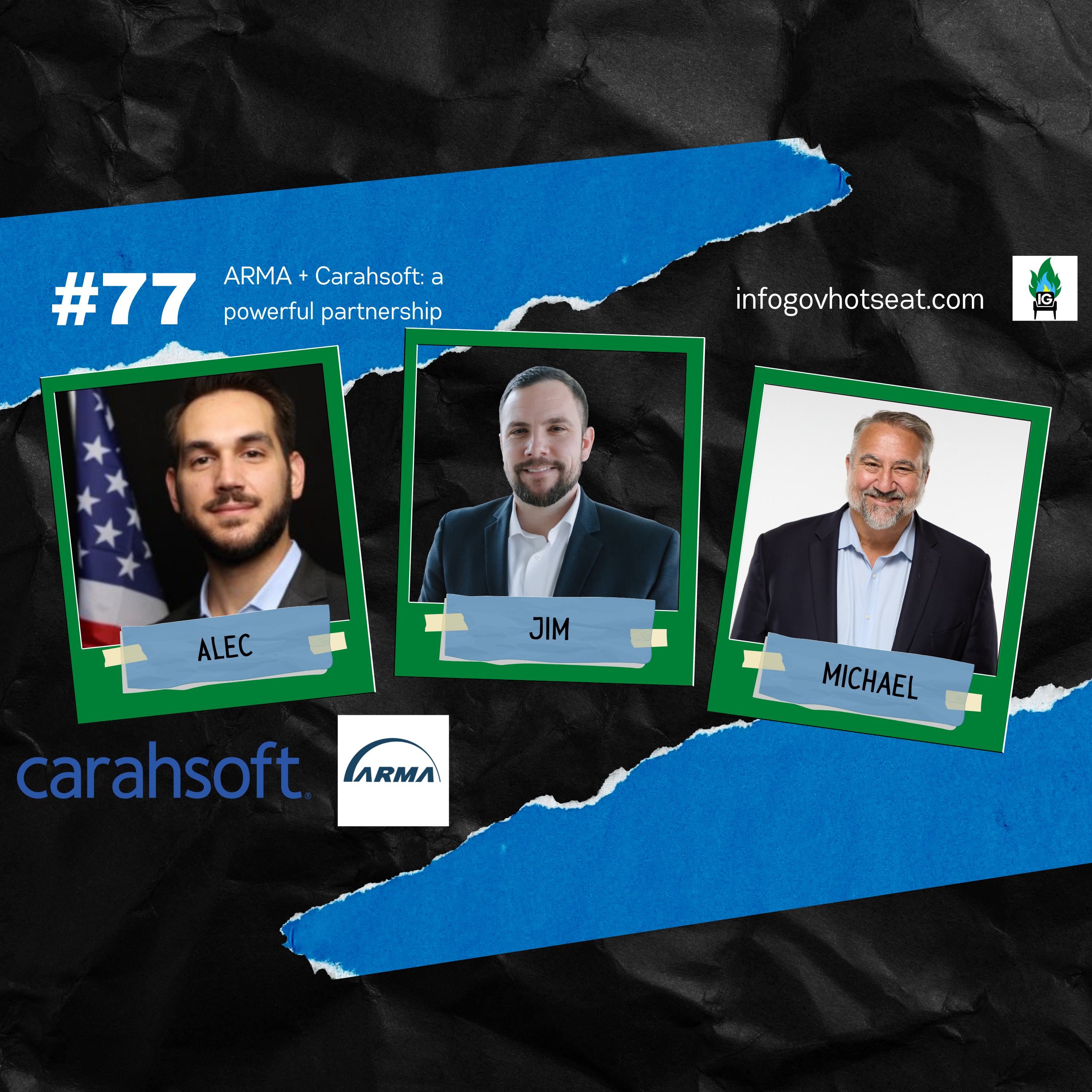IGHS33 - Interview with Michael Potters
Michael Potters, founder of Glenmont Group, discusses his background and the current hiring landscape in the information governance field. He emphasizes the importance of standing out in a competitive market and offers advice on how to do so, including utilizing LinkedIn effectively and developing expertise in data science and AI. Potters also highlights the impact of remote work on recruitment and identifies industries and skills that are in high demand, such as data science and compliance. He concludes by encouraging job seekers to recognize the value of their knowledge and expertise.
Jim Merrifield (00:00.395)
Well, hello and welcome to the InfoGov hot seat. I'm your host Jim Merrifield and with me today is Michael Potters at Glemont Group. Welcome, Michael.
Michael Potters (00:08.543)
Welcome Jim, thanks for inviting me on. I've done a lot of work with ARMA, been involved with them for 30 years. This is the first time I've ever been interviewed by them, so it's kind of unique and I'm looking forward to this.
Jim Merrifield (00:21.547)
Yeah, it's awesome. It's nice to have you on the hot seat. And so let's get into it and learn a little more about yourself. Can you tell us a brief introduction of your role, how long you've been with Glenmont Group, and one fun fact about yourself?
Michael Potters (00:32.831)
so Glenmont Group started 24 years ago. My wife and I founded it after I left a career in legal technology and InfoGov. Not InfoGov, I mean information management, doing sales and management for an information management company. And then before that, I was in the consumer electronics business designing sound systems. That was the first half of my life. We started the company 24 years ago.
Um
really because we saw a void in the way they were staffing for legal technology positions and the way they were staffing for information management positions. It was a real void and a lack of understanding. So my wife and I saw that as an opportunity. We started it by actually buying a franchise of a company called Management Recruiters International, which had 1 ,100 offices. We started at the bottom, and by the time we left our contract, we had a 10 -year contract, we were number 72 in the world.
out of 1100 in large part because we stayed focused. It's funny, we started in really electronic discovery before it was called electronic discovery and InfoGov grew all around us. So because electronic discovery, we're sort of based in records management and I had an understanding of that. And then everything sort of fell under that forensics, cybersecurity, compliance, risk, all the things that it wasn't even called InfoGov before, but those are all the positions where we were working on.
grew all over us and we expanded quite a bit. We worked with the law firms and then the providers and then the corporate.
Michael Potters (02:11.583)
corporations, legal departments mostly in that. And it's been a great run. You know, I think hopefully we're going to have another 24 good years of this thing, but it's been fun to do. As opposed to a fun fact, I'm going to give you a fun falsehood or a fun non -fact. So my LinkedIn is quite extensive. Most people have seen the postings and stuff that I've done on LinkedIn and I have over 10 ,000 connections on it. And on the LinkedIn, there are
Jim Merrifield (02:28.523)
Ha ha.
Michael Potters (02:41.537)
couple of falsehoods that are out in front for everybody to see. One that I played center field for the Mets under the name Mookie Wilson, because that was my favorite Met player. And the other was that I played guitar for the Grateful Dead because I was the next Deadhead. I did it as a joke when LinkedIn first came out. We were early adopters to it. I just didn't really know what to put in. So I just joked about it. I got so much buzz around that and so much humor around it, about it. And people contacted me.
that I never thought would contact and like the sense of humor and the authenticity that I've never changed it. So the fun fact is I've never played or the fun non -fact is I never played guitar for the Grateful Dead. By the way, Jerry Garcia is dead and I'm not Mookie Wilson. So.
Jim Merrifield (03:26.123)
That's awesome. So hey, it was a good marketing ploy, right? I'm sure it drew some people to you.
Michael Potters (03:32.255)
I wanted, well, that's exactly why, Joe. I did it because I wanted to stand out. I mean, how can you, and this is advice for everybody. You have to stand out in a market to get noticed. So, and if you really great at something, you're not standing out because there are a lot of people who are really great at things. You're in that percentage, that top 20%. You know, there are a lot of great recruiters like myself. There are a lot of great.
you know, VPs of technology, there are a lot of great eDiscovery attorneys out there, but you have to brand yourself to a certain degree to stand out. And I taught a class at Columbia University, it was all about career branding. And I said, go at it with, you know, authenticity, a sense of humor. Don't try to sound like everybody else. You can make yourself stand out by saying, I'm the best of, because everybody says that or believes that.
Jim Merrifield (04:22.443)
Yeah, for sure. Well said. So let's switch gears a little bit. Thanks for giving me a fun non -fact about yourself. And so let's talk about hiring. You mentioned, I know you've been, you've owned Glenmont Group for over 25 years. So can you share some insights into the current hiring landscape and any notable trends?
Michael Potters (04:24.351)
Thank you.
Michael Potters (04:43.743)
Well, it's definitely, there's sort of a sea change in the trends in hiring that happened around COVID. There's definitely been a change. So there's sort of the post -COVID trends, and then you put on top of that the buzz around AI and the buzz around data science. And that's created a lot of activity. They're also relative to ARMA,
There was information governance positions, but not the desire to fill them. There wasn't that sort of aggressiveness. We need this position. We have to have it. It was almost as if it was an evil necessity at all.
And there was a lot of fighting. And I thought when I first got involved with InfoGov that I was going to end up getting a lot of searches and a lot of positions in that. It turned out to be the opposite. I didn't get that many. There weren't the budgets for it. That's changed in large part because of the breaches that have happened. So there have been some very, very famous large breaches now lately at the law firms. And that's changed everything.
without mentioning a law firm that I just placed a CIO at. Two years ago, they didn't think their you -know -what stunk and they didn't think they had a need for anything. They got breached twice. Now, there's an absolute necessity to have the right people in place from the top down.
They changed CIO and they changed the people below that because they needed to have a team that understood that world. Why did they need that? They didn't think they needed it before because it was a call center. But once the breaches happened, they lost a couple of key clients. The partners at the law firm started freaking out and they go, no, we have to take care of this and take care of that now. So that's been an absolute sea change on that.
Jim Merrifield (06:33.835)
That makes a lot of sense data breach AI right game changer those two
Michael Potters (06:35.967)
They gave total game changes. Chaos is good for our world, you know, so.
Jim Merrifield (06:41.931)
Yeah, absolutely. Couldn't agree with you more. So let's talk about qualities or skills. What qualities or skills do you prioritize when evaluating potential candidates? Because I can't, you know, you mentioned before, everybody's great, right? Or most people are great. So I would think your qualities or skills maybe enable you to stand out.
Michael Potters (06:54.751)
Everybody's great. It's the soft skills. Yeah. So we sort of pride ourselves in placing that we call them the top 20 percenters that old Jack Welch at GE, the 80 -20 rule.
So we try to place the top 20 % and those are the talented people in every industry that have risen to the top career wise, whether it's in sales or marketing or IT or whatever it is, law, you know. So we pride ourselves in that and you're right, those people all look good. They're all very well defined. They all have the right certifications. They've all gone.
I don't even want to say the right schools because it's not as relevant as it used to be. It's mildly relevant, but it's not as relevant. But they worked for the right companies, but they did the right things. But how do you stand out? You stand out by, well, you have to be noticed. So one of the things that I tell people all the time is LinkedIn is a tool that most people don't use properly.
LinkedIn people tend to look at it as like collecting baseball cards. I've got more connections and then they don't do anything with it. But LinkedIn is a ridiculously valuable tool for a bunch of reasons. You can use it to research where the industry is going and what the hot needs are by simply looking at the job postings there. Most of the people who are posting jobs on LinkedIn, whether it's your firm or a corporate legal department or a consultancy.
They're looking at that tip of the spear type jobs. They want the most valuable information that's current to them and is a need. And you can go on LinkedIn and research and see what's needed. And if you don't have that in your background, get it in your background. What I think is even worse is people who do have that in their background and don't promote it because they have a very weak LinkedIn page. The thing about LinkedIn, and I don't work for LinkedIn, I'm not getting any money for this. Everybody knows.
Michael Potters (08:52.735)
But the thing about LinkedIn is you can get discovered on LinkedIn very easily because not just recruiters, but you, if you're looking for somebody, you're going on LinkedIn and looking for skill sets, you get discovered on LinkedIn. But if you don't have the information on there, the keywords on there.
that people are looking for, you can't get discovered. People call me all the time and say, what should I do with my resume? Can you look at my resume? And I said, waste of time. Resume is a placeholder. Nobody's going to ever discover you because your resume was on your desktop, and they somehow got in on it and saw your resume. They have no idea. It's just a placeholder that the HR department wants. When you apply for the job, it goes into the portal there.
But they can discover you on LinkedIn. So you go on LinkedIn, see where the needs are. If you have that in your background, make sure that it's on LinkedIn and utilizing it. And if you don't have that in your background, figure out how to get that. Volunteer for certain positions in your department. Offer to help certain areas. Offer to get certifications on those things. So you get that in there.
Jim Merrifield (09:57.835)
Yeah, no, LinkedIn is a game changer for sure. Whether they're looking for a job or connections or trends in the industry, I couldn't agree more with you on that. So another game changer has been remote work, right? COVID, I think, has changed the game for us. And I'm sure from a recruiting standpoint as well. So how has remote work, the trend of remote work, impacted your approach to recruitment?
Michael Potters (10:07.487)
Yeah.
Michael Potters (10:22.047)
So that again, that's just post COVID world. It's worked in two very distinctive sides. So people don't wanna go back into the office full time anymore. Let's be honest about that. If they don't need to, they don't wanna go back in there. I can say from observation, cause I get to look at this world from 6 ,000 feet that millennials are...
Okay, going back in the office a little bit, but they all have kids now. So they've had a taste of being home with the kids and stuff. So they're not big on going back in the office. Gen Zers, they don't mind being back in the office because they want to hang out with their friends and go to the bars in New York or in Boston or in Chicago afterwards and do that. And also empty nesters, the more senior people, they want to go back in the office. So they don't mind it. But nobody really wants to go back full time on the thing. So that's become a challenge. But it's also become a value and an asset. And I'll explain it this way.
There were some firms or some companies that couldn't get the top talent because it was the top talent always wanted to work for a certain company.
certain compensation. Now these people are available and all you have to do to get them is say, hey, I'll let you work remote. I'll let you work one day a week in the office. I'll let you do that. And there are people who will take, I get calls from candidates who honestly say I'll take less money right now. So it becomes a compensation thing. If I don't have to go to New York city or Boston on a daily basis, pay for the commute, pay for the tolls, pay for the food, the clothes, pay for the food and everything else. And I could just stay home and do that. So.
take less money sometimes. But money does not become the issue. They want to work remote. But that allows the companies to get people that they couldn't have gotten before. The other side of the coin though is in a challenging marketplace. If you're competing against somebody else on it, if you simply say, I'll come to the office as much as you want. I'll come to the office five days a week. That's going to make you stand out against somebody else who you're kind of equal with.
Michael Potters (12:28.703)
So it can work both ways and you have to decide what side of the fence you want to be on there.
Jim Merrifield (12:33.227)
Yeah, that makes sense. I mean, so speaking of job seekers, right? What advice do you have for job seekers looking to stand out in a competitive market? I know you mentioned a couple of things, but anything else to add on that? That's all.
Michael Potters (12:43.935)
Well, one thing I definitely do again, boy, I'm sick of bringing up LinkedIn, but you have to promote yourself on LinkedIn. We're considered a global company, but we're out of a suburb in New Jersey. We're actually a smaller company, but people think we're giant because I've posted so much on LinkedIn. A lot of original material on this. I've been involved. I've communicated with people on there. Be active on LinkedIn. Write articles. Start learning how to use chat.
You know, you have to do, there's a lot of careers around AI now. So start by utilizing chat to write articles for you that you're going to enhance by getting your own thing on it. It's much more valuable to post articles that are your own as opposed to sharing other people's articles.
There's a value in sharing other people's articles, but you don't get the brand. You don't get that subject matter expert brand. But if you start posting things in the areas that you're knowledgeable in, then you get recognized with that and people want to see more and more of that and it gets shared. I've posted things that have gotten upwards. Well, the largest posting I got was actually a joke. It was a comic art on data science.
I didn't know it was going to go big, but somehow it got global. It got over 100 ,000 views and over 1 ,000 likes on the thing because it went global. But it's not out of the ordinary at all for something that I post to get 5 ,000 to 10 ,000 views. That's a lot of people who are going to see you that can't see you if you don't do that. They don't know who you are. So I would start doing things like that. I'd get involved, start writing things, start posting things. And, um.
Communicate with people I do have one rule if you're gonna do stuff like that if you post something Anybody who likes what you've posted on it right back to them Thank them for the like start the conversation. Don't let it be static get something out of it
Jim Merrifield (14:43.691)
Yeah, that's great. That's great advice, right? It's just not a passive like And it could start some conversations I think what I did on one of my posts that you just made me think of it is you know I posted out there and then everyone who liked I think I responded back in the comments and say look I'd love to know what you liked about the article and honestly I got about you know, I think out of the 20 or 30 people that liked it I think like 20 20 people actually responded back and said, you know, I like this portion of the article
Michael Potters (14:47.615)
Don't be passive.
Michael Potters (15:01.631)
Yeah!
Jim Merrifield (15:12.395)
that portion of the article. So it generated a little bit, it was like a quick nudge, but you're right. I think it definitely helps if you try to engage people in that manner.
Michael Potters (15:21.567)
The other thing about that too is if you go to an ARMA event or any of these big events around the country,
you're not likely to have even 10 solid conversations. It's just an effort, you know? And then what you end up doing is what most people do is they search out their friends and then they have drinks or dinner with their friends and then share stories with them. But when you do it this way, you can actually have 50 to 100 conversations that will all be valuable to your career and you will get noticed. They'll know who you are down the road. So.
Jim Merrifield (15:56.395)
Yeah, no, that's powerful, powerful statement there. So here's another question. Are there specific industries or skills that you foresee being in high demand in the near future?
Michael Potters (16:07.359)
It's sort of it. If you go around, I just came back from legal week, right? Not long a month ago and every year legal week, there's the banner of the year thing, right? It just changes, you know, from TAR to whatever it is. It's whatever's hot, right? And you do want to be at that tip of the spear. But there's no question that the jobs that are out there now, and again, you can do this by looking on Indeed and looking on LinkedIn jobs.
They all want data science and they all want you to have some sort of knowledge on AI. So you have to at least have it. You don't have to be an expert in any of this stuff. You just have to be conversant in it and enough. So the person who's about to be, I mean, you're a hiring authority, Jim.
You just, you'd like if they're an expert in something, but if you know that they have a deep understanding of it or some understanding of it that's of value and you don't have to handhold them, then that's gonna, I think, make you more interested in that. So I would say certainly on data science, AI, compliance, risk.
It's funny people still talk about GDPR and CCPA. A lot of those things have been taken care of already. Those things have settled down. It's not done. You should have a knowledge of it, but to promote that, to make that front and center, maybe not as valuable as doing pure data science and data analytics.
Jim Merrifield (17:28.715)
Yeah, no, I agree. I mean, I think you need some sort of AI something. And you mentioned LinkedIn. I mean, again, I'm not getting paid for LinkedIn for saying this, but LinkedIn does have LinkedIn learning. There's a lot of great courses out there. I know even like Microsoft has free courses out there. Google's got free. There's tons of like, even if your budget is tight with AI, I mean, there's tons of courses out there that are free, right? That you can kind of,
Michael Potters (17:39.423)
Another one's hard. Yeah.
Michael Potters (17:47.359)
Yes.
Michael Potters (17:56.095)
Mm -hmm.
Jim Merrifield (17:58.219)
Now, are you going to be an expert in AI after taking those courses? No. But you'll at least have a good idea and at least be able to have a conversation about how AI affects your job, right? But for sure.
Michael Potters (18:11.007)
Yeah. So, and also understand that there's two types of career branding, is the best way to describe it. There's external career branding, so how you look.
How do you look to the marketplace? How does the marketplace see you or the industry see you? But this internal branding, how does your company see you? How does your employer see you? And there's a big value with that. If they see you having that sort of expertise and you're going to be pulled in to help grow areas that's going to make you more advanced and move you up on the food chain, they're going to use you for mentoring, to mentoring young people on the thing. I'm sure you do that all the time. You mentor people, but you also have your
people that you hire you want them to work with the people to mentor them as well so you know look for internal branding to let people within your company know what you know somehow yeah
Jim Merrifield (19:02.763)
Yeah, that's a great point. So Michael, we've talked about a lot of stuff here, right? But any final thoughts for the audience?
Michael Potters (19:09.567)
Uh, yeah. I think the final thought I want certainly to the info gov world out there that I think I'm being very honest about is the information that you have in your head right now is incredibly valuable and it allows you to get positions.
and not have to worry so much about your age. I've placed people upwards in their 60s because of what they had in their head. It's fairly well balanced gender wise. It's multicultural. They really want to hire what's in your head right now. So take advantage of that and don't.
Don't say it's a young person's world, because I've heard that a couple of times. It's the people that are going to Stanford, or the people going to MIT, or the people going to whatever school that are getting all the jobs. That's not the case at all. That may be the one that get the first job, but you can take advantage of that if you're smart and not let that get in the way of things. So that would be my words of wisdom.
Jim Merrifield (20:25.067)
Michael Potter's final thought, words of wisdom. I love it. Well, yeah.
Michael Potters (20:27.647)
Yeah, I have them sometimes. I have them. More sense of humor than words of wisdom.
Jim Merrifield (20:33.771)
No, I think we got lots to talk about but you know for this episode Thank you so much for for joining us today and allowing you know to have a conversation here and again Thank you for everyone for attending today's episode of the info gov hot seat Please visit our website infogovhotseat.com to view our latest episodes and if you'd like to be a guest on the hot seat like Michael here all you have to do is please Submit your information through the website. We'll get you on the calendar and thank you so much
Michael Potters (20:41.599)
My pleasure.
Michael Potters (21:01.823)
Raise your hand. That's all I did. I just raised my hand. So you have to take care now. Take care.
Jim Merrifield (21:03.947)
That's right. Thanks for sharing that, your wisdom. Take care.

CEO/Talent Whisperer
Michael Potters co-founded the Multi-Award winning firm Glenmont Group in 2001 as a boutique affiliate office of Management Recruiters International. Michael leveraged his twenty plus years of experience in business development and management, specializing in Data Science, AI , Information Governance, eDiscovery, Enterprise Content Management and Legal Technology. Noticing an absence of a firm specializing in the recruitment and placement of highly qualified legal technology talent and having personally recruited, hired and trained hundreds of technology leaders, Michael set off to create a “best of breed” boutique firm. In five short years Michael and his partner (and wife ) Kate, lead the successful growth of The Glenmont Group to become the largest Executive search firm dedicated to the practice of Professional Services, Legal Technology and Legal IT. The Glenmont Group also has the distinction of being named:
He prides himself on his ability to find the right fit for both his clients and his candidates. Having successfully run and built a number of business units, Michael knows very clearly what it takes to drive revenue to a corporation's bottom line.
FAVORITES:
Band: Phosphorescent (at least this week)
Restaurant: White Manna
Movie: Arsenic & Old Lace (if you've seen it you'd get it!)
Sports Team: SUPERBOWL CHAMPS; New York Giants!!!
Steven Wright Quote: "I was reading the dictionary. I thought it was a poem about everything."
Contact at: michael.potters@glenmontgroup.com
